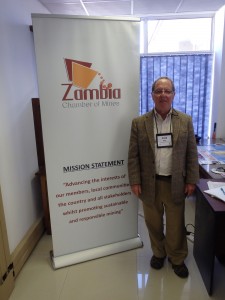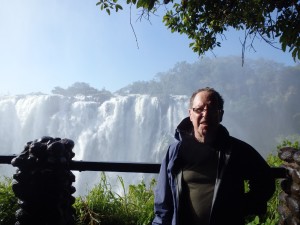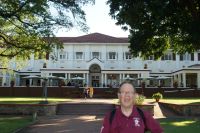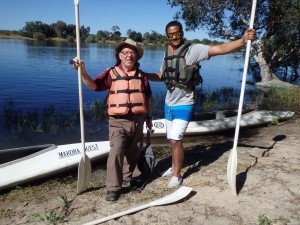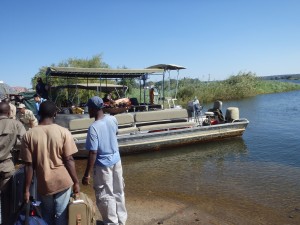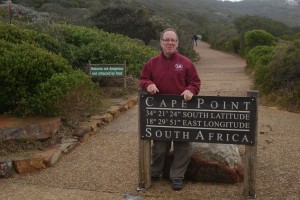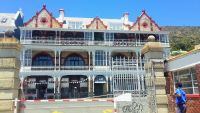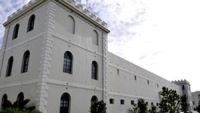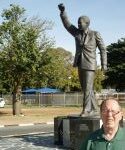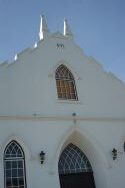Johannesburg
Marketers know that a strong finish colors the entire consumer experience.
If that’s the case, the South Carolina FDIB certainly planned this trip well. We concluded our business visits today, having come the 800 miles from Lusaka early this morning, with what might be the best visit of the trip. We went to Dimension Data, an IT subsidiary of Japan’s NTC, the telecom giant, where we were hosted by Derek Wilcox, a South African who has been with company as it has grown to major global status, where it is now an $8 billion corporation, operating in 58 countries with 27,000 employees. Mr. Wilcox is the COO of Asian and Middle Eastern operations, and thus was in a position to enlighten us on the IT industry, his company, Africa and the Middle East, and South Africa.
The company started in 1983 in manufacturing and gravitated to provide applications, installation, maintenance, and other services, which now provide 50% of sales and 75% of profits. (My students who have read “Going Downstream” will understand the value of the shift!). It was at one time the exclusive distributor for Cisco, and is still one of its biggest partners.
His outline of African business was especially interesting because it covered the entire continent; he divided the continent basically into regions: 1) the Mediterranean countries, which he said were still recovering from the Arab Spring; 2) the oil producers, particularly Ghana and Nigeria (he had a lot to say about Nigeria, which has the largest population in Africa, and by some accounts, the largest GDP, with Lagos being the business center); 3) the East Coast countries which are starting to discover gas, and 4) the African hub starting to consolidate around Kenya. Despite its political troubles with Somalia, he thought East Africa is an attractive area, rapidly developing, and noted that Kenya has a big agribusiness market in Europe (bear in mind, if it’s winter in Europe, it’s summer down here, ala Chile and Peru and the US market); and 5) southern Africa. He thought one of the countries to keep an eye on was Botswana, a potential model for sound government (not common on the continent), but with an economy still based on diamonds, cattle, and tourism.
As for South Africa itself, he pointed out that South Africa contributes 40% of African income and 40% of that comes from two neighborhoods in Johannesburg, including Sandton, where our hotel is located; however, the country’s strength is weakening both absolutely and relatively, having, he suggested, lost its political and social way. Like many business men, he chafed at the use of funds for addressing social needs, describing the state as having more social safety nets than many Scandinavian countries. At the same time he acknowledged the need to redress the inequalities that mark wealth distribution in the Republic. We’d heard from others as well about some of the problems of the African National Congress, which has ruled South Africa since democracy emerged in 1994, and he, too, thinks the rise of an opposition party (which has taken over the Western Cape) will be a healthy step.
He described South Africa as a relatively difficult place to do business, with exchange controls, an elaborate effort to promote Black Enterprises, and a strong labor force that supports and is supported by the African National Congress (and, in addition, one of our faculty noted that South Africa will start requiring in-person visits to a consulate to get a visa, making it more difficult to tour or work as an expatriate in the country) ; as evidence of the erosion of South Africa’s global status, he noted the declining number of companies (from 95% to 80%, he estimated) that base their African operations in South Africa. Instead, many have located or relocated to the United Arab Emirates. He thought those governments had shrewdly expanded Emirates and Qatar airlines, which have some of the most extensive routes in the world, world class facilities, and a welcoming government. He did observe the disadvantages, though, such as that the UAE does not have a rule of law, while South Africa has a well-established judicial system.
Some summary thoughts on my observations about sub-Sahara businesses:
1) The role of the United States. The African Growth and Opportunities Act, recently renewed by Congress, is generally praised as a positive contribution to the African economies, reducing tariffs on African products imported into the United States. Ambassador Taylor gave high marks to the US’s anti HIV campaign, too, and it’s obvious, from the visits we’ve had, the embassies are promoting American investments and non-government activities. Still, as Wilcox pointed out, there’s a belief that Americans are the latest exploiters, who simply want to make short-term profits for shareholders. He noted that US AID gives money—which must be spent in the United States.
2) There was a copy of the China Daily in the lobby of our hotel today, an indication of the importance of the topic that keeps surfacing: the presence of China. China has supported a lot of the independence movements in Africa from the beginning, and has continued supporting many African governments and economies with no strings attached. Chinese build dams and roads and railroads—and mushroom “factories.” They give grants to send African students to Chinese universities. However, the relationship is becoming a little frayed. The Chinese are disappointed with some of their “investments,” such as Mugabe in Zimbabwe, and Africans are concerned about the cliquishness of overseas Chinese and the traders who are perceived to be stealing African jobs.
3) South Africa sometimes thinks of itself as a big brother especially to its neighbors. If it’s going to be a model, it needs, I think, to behave better. The Joburg newspaper today had the defense of the president’s $21 million expenses for his house: he needed, it stated, the visitor center to protect his privacy, and the cattle corral to keep the cattle from interfering with the security infrastructure, etc. If I had a big brother like that…. Still, South Africa is further along the development curve than the rest of the continent, and has a hand in lots of business on the continent. It has also played peacemaker on occasion.
4) As for what we’ve seen overall, the metaphor that comes to mind was at Kafue. That small town in Zambia, on the main North-South highway from Lusaka to Livingstone, had a sign advertising the opening of a mall, with retail space available. At the time we passed by, we could see that some of the foundation for some of the buildings had been started. That location is business Africa for me: the foundations have started in some places, but the mall is still a distance away from being built.
In 24 hours, most of us will be on an airplane back to the US, with a lot of experiences to share with our classes.
